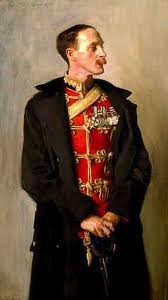11 October 1915
General Sir Ian Hamilton, Headquarters, Mediterranean Expeditionary Force - The 11 October marked the end for Sir Ian Hamilton. His peremptory response to a perfectly reasonable question from Kitchener marked the point when the High Command back in London realised that Hamilton was not the man to get a grip on a rapidly deteriorating situation. His health was also poor - dysentery was draining away his strength as it was so many of his men.
 Bad night with this beastly complaint. De Robeck came up at 11 o'clock to see me. He has had a message from the Admiralty asking him what number of extra troops could be maintained on the Peninsula if the units there now were brought up to strength. The Admiral asked me for the figures and the A.G. brought them over. My force as a whole is as near as may be to half strength. Half of that half are sick men. We have 100,000 men on the Peninsula, 50,000 of whom are unfit: if the unfits were up to strength there would be 200,000 men on the Peninsula as well as excitement and movement which would greatly reduce the disease. Bearing in mind that the Anzacs have been well supported by their Governments and that their units are fairly strong, these figures show what wait-and-see-sickness has meant to British Regiments. The tone of this Admiralty question had seemed cheerful: almost as if the Higher Direction were thinking of putting us on our legs but, in the evening, another cable from K. gave a different and a very ominous complexion to the future: "From Earl Kitchener to General Sir Ian Hamilton. What is your estimate of the probable losses which would be entailed to your force if the evacuation of the Gallipoli Peninsula was decided on and carried out in the most careful manner?" No decision has been arrived at yet on this question of evacuation, but I feel that I ought to have your views. "In your reply you need not consider the possible future danger to the Empire that might be thus caused." If they do this they make the Dardanelles into the bloodiest tragedy of the world! Even if we were to escape without a scratch, they would stamp our enterprise as the bloodiest of all tragedies! K. has always sworn by all his Gods he would have no hand in it. I won't touch it, and I think he knew that and calculated on that when he cabled. Anyway, let K., cat or Cabinet leap where they will, I must sleep upon my answer, but that answer will be NO!
Bad night with this beastly complaint. De Robeck came up at 11 o'clock to see me. He has had a message from the Admiralty asking him what number of extra troops could be maintained on the Peninsula if the units there now were brought up to strength. The Admiral asked me for the figures and the A.G. brought them over. My force as a whole is as near as may be to half strength. Half of that half are sick men. We have 100,000 men on the Peninsula, 50,000 of whom are unfit: if the unfits were up to strength there would be 200,000 men on the Peninsula as well as excitement and movement which would greatly reduce the disease. Bearing in mind that the Anzacs have been well supported by their Governments and that their units are fairly strong, these figures show what wait-and-see-sickness has meant to British Regiments. The tone of this Admiralty question had seemed cheerful: almost as if the Higher Direction were thinking of putting us on our legs but, in the evening, another cable from K. gave a different and a very ominous complexion to the future: "From Earl Kitchener to General Sir Ian Hamilton. What is your estimate of the probable losses which would be entailed to your force if the evacuation of the Gallipoli Peninsula was decided on and carried out in the most careful manner?" No decision has been arrived at yet on this question of evacuation, but I feel that I ought to have your views. "In your reply you need not consider the possible future danger to the Empire that might be thus caused." If they do this they make the Dardanelles into the bloodiest tragedy of the world! Even if we were to escape without a scratch, they would stamp our enterprise as the bloodiest of all tragedies! K. has always sworn by all his Gods he would have no hand in it. I won't touch it, and I think he knew that and calculated on that when he cabled. Anyway, let K., cat or Cabinet leap where they will, I must sleep upon my answer, but that answer will be NO!
Once again - as so often before - during the Gallipoli campaign, Hamilton was entirely and utterly wrong. The end was nigh....
"SOURCE:
Sir I Hamilton, Gallipoli Diary, Vol.II, (Edward Arnold: London 1920), pp.249-250.
